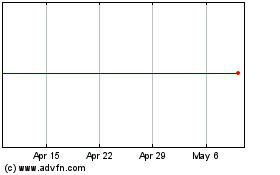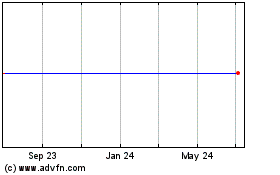CBS and the Need to Hold Directors Accountable
September 16 2018 - 11:29AM
Dow Jones News
By Ronald Barusch
Here is a view you won't hear from many practicing corporate
lawyers, as they are always on the prowl for their next client: Our
corporate-governance system is in serious need of reform. Directors
need to be held more accountable when they fail to set the proper
tone at the top, and right now there is almost no consequence for
most governance failures. There may be no better argument for
re-examining the system than the problems at CBS Corp.
Set aside for the moment the unacceptable harassment that three
of CBS's most prominent personalities -- all now former employees
-- have been accused of. Television host Charlie Rose, former CEO
Les Moonves and "60 Minutes" Executive Producer Jeff Fager have
denied these allegations, and the board's investigations continue.
Beyond that, the reports Wednesday about how Mr. Moonves and Mr.
Fager tried to deal with the allegations are devastating
reflections of what seems to me to be a culture problem at CBS.
The New York Times reported Wednesday that Mr. Moonves tried to
find one of his accusers a job at CBS when she threatened to go
public with the allegations, and Mr. Moonves did this without
reporting the situation to the board. His departure from the
company was announced Sunday.
Also Wednesday, Mr. Fager's employment with CBS was terminated.
CBS said it wasn't directly related to the sexual-harassment
allegations against him. Mr. Fager had sent a text message to a CBS
News reporter who was reporting on those allegations, which
apparently threatened her by saying that "there are people who lost
their jobs trying to harm me..."
Even more bizarrely, before the language had been reported, Mr.
Fager characterized the text message merely as "harsh language" and
pointed out that "journalists receive harsh demands for fairness
all the time." This may be true, but such "demands" wouldn't
generally come from a subject of the reporting who has the
potential power to influence a reporter's firing. And the fact that
this happened in the leadership of a news organization -- at the
most senior levels of "60 Minutes," no less -- is gravely
concerning. CBS and a representative for Mr. Moonves declined to
comment. Attempts to reach Mr. Fager were unsuccessful.
The right response for any employee who learns of allegations
against him -- no matter how untrue they may be -- is to report
them to a supervisor (or if you are the CEO or a director, to the
board). So how did the culture develop that seems to have empowered
these two executives to allegedly use self-help and take action
that could even just be perceived as keeping information from the
board? Especially when they (and the world) knew the board had
already commissioned investigations of the harassment allegations
against them? The board must bear some responsibility for that
culture. A major restructuring of the board was announced Sunday
along with Mr. Moonves's departure, but will there be other
consequences?
From a legal perspective, it is extremely unlikely current or
former directors will have any liability. The leading case in
Delaware -- where CBS is incorporated -- says that "only a
sustained or systematic failure of the board to exercise oversight"
will create liability. That is a pretty weak standard to measure
the conduct of directors of our most prominent corporations.
But from a corporate lawyer's perspective it makes sense, at
least under our current system. The only way to hold directors
accountable for their failure to fulfill their duties (other than
voting them out of office) is through class action-type lawsuits
where, if the directors lose, they would be responsible for
enormous levels of damages. So, the logic goes, if we want quality
people to serve as directors, we need to severely limit such a
draconian remedy to situations in which directors are only nailed
if they affirmatively do something beyond the pale.
But that is a false dichotomy created over the years by
legislators, judges and practicing corporate lawyers. It arises
from a legal structure where the only enforcement of fiduciary
duties is through class action-type litigation, which can result in
jury trials and where the damages are measured against the harm to
multibillion-dollar companies.
A better approach, which one finds in other countries, is that
statutes and regulations set out a more aspirational standard for
conduct expected for directors (which I would hope would be
something more demanding than avoiding a "sustained or systematic
failure") and an administrative remedy when directors are found to
have breached that standard that is based on the nature of the
failure. Such remedies could include censure, reasonable levels of
fines or barring directors who failed the test from holding a
fiduciary relationship -- all only after accused directors have an
opportunity to contest the allegations.
We don't know all the facts. And there was an extended
internecine war over control at CBS which may have had an impact.
But from my perspective as an outsider with imperfect information,
between Wednesday's revelations and the multitude of harassment
allegations, it looks like something went wrong with the leadership
by the CBS directors who were, after all, responsible for
governance.
And there should be consequences for this type of failure: Not
cataclysmic liability for anyone who operated in good faith, but if
in the future a board of a public company fails to live up to an
appropriate standard of leadership and governance, there should be
some rational remedy.
(END) Dow Jones Newswires
September 16, 2018 11:14 ET (15:14 GMT)
Copyright (c) 2018 Dow Jones & Company, Inc.
CBS (NYSE:CBS)
Historical Stock Chart
From Mar 2024 to Apr 2024

CBS (NYSE:CBS)
Historical Stock Chart
From Apr 2023 to Apr 2024
